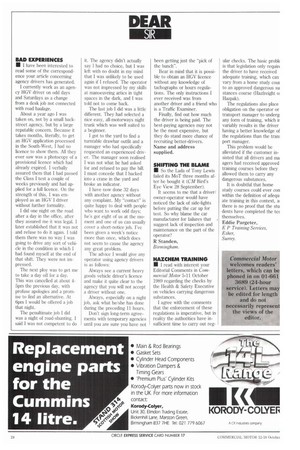DEAR
Page 26

If you've noticed an error in this article please click here to report it so we can fix it.
SIR
BAD EXPERIENCES
• I have been interested to cad some of the correspondence your article concerning agency drivers has generated.
I currently work as an agency HGV driver on odd days and Saturdays as a change from a desk job not connected with road haulage.
About a year ago I was taken on, not by a small backstreet agency, but by a large reputable concern. Because it takes months, literally, to get an HGV application processed in the South-West, I had no licence to show them. All they ever saw was a photocopy of a provisional licence which had already expired. I verbally assured them that I had passed the Class I test a couple of weeks previously and had applied for a full licence. On the strength of this, I was employed as an HGV I driver without further formality.
I did one night on the road after a day in the office, after they assured me it was legal. I later established that it was not and refuse to do it again. I told them there was no way I was going to drive any sort of vehicle in the condition in which I had found myself at the end of that shift. They were not impressed.
The next ploy was to get me to take a day off for a day. This was cancelled at about 45pm the previous day, with profuse apologies and a promise to find an alternative. At 6prn I would be offered a job that night.
The penultimate job I did was a night of road-shunting. I said I was not competent to do
it. The agency didn't actually say I had no choice, but I was left with no doubt in my mind that I was unlikely to be used again if I refused. The operator was not impressed by my skills at manoeuvring artics in tight spaces in the dark, and I was told not to come back.
The last job I did was a little different. They had selected a nice easy, all-motorways night trunk which was well suited to a beginner.
I got to the yard to find a turntable drawbar outfit and a manager who had specifically requested an experienced driver. The manager soon realised I was not what he had asked for and refused to pay the bill. I must concede that I backed into a crane in the yard and broke an indicator.
I have now done 32 days with another agency without any complaint. My "contact" is quite happy to deal with people who want to work odd days; he's got eight of us at the moment and one of us can usually cover a short-notice job. I've been given a week's notice more than once, which does not seem to cause the agency any great problem.
The advice I would give any operator using agency drivers is as follows;
Always see a current heavy goods vehicle driver's licence and make it quite clear to the agency that you will not accept a driver without one.
Always, especially on a night job, ask what he/she has done during the preceding 11 hours.
Don't sign long-term agreements with temporary agencies until you are sure you have not been getting just the "pick of the bunch".
Bear in mind that it is possible to obtain an HGV licence without any knowledge of tachographs or hours regulations. The only instructions I ever received was from another driver and a friend who is a Traffic Examiner.
Finally, find out how much the driver is being paid. The best-paying agencies may not be the most expensive, but they do stand more chance of recruiting better-drivers. Name and address
supplied.
SHIFTING THE BLAME • So the Lada of Tony Lewis failed its MoT three months after he bought it (CM Bird's Eye View 28 September).
It seems to me that a driver/ owner-operator would have noticed the lack of side-lights before putting the car up for test. So why blame the car manufacturer for failures that . suggest lack of inspection and maintenance on the part of the operator?
R Standen, Birmingham.
NAZCHEM TRAINING
• 1 read with interest your Editorial Comments in Commercial Motor 5-11 October 1989 regarding the checks by the Health & Safety Executive on vehicles carrying dangerous substances.
I agree with the comments that the enforcement of these regulations is imperative, but in reality the authorities have insufficient time to carry out reg
ular checks. The basic probk is that legislation only reguiri the driver to have received adequate training, which can vary from a home study coin to an approved dangerous su stances course (Hazfreight Hazpak).
'The regulations also place obligation on the operator or transport manager to underg any form of training, which ir variably results in the driver having a better knowledge of the regulations than the tram port manager.
This problem would be alleviated if the customer insisted that all drivers and ma agers had received approved training courses before they allowed them to carry any dangerous substances.
It is doubtful that home study courses could ever con within the definition of adequate training in this context, a: there is no proof that the stu dents have completed the te: themselves.
Eddie Pargeter, E P Training Services, Esher, Surrey.
































































































































